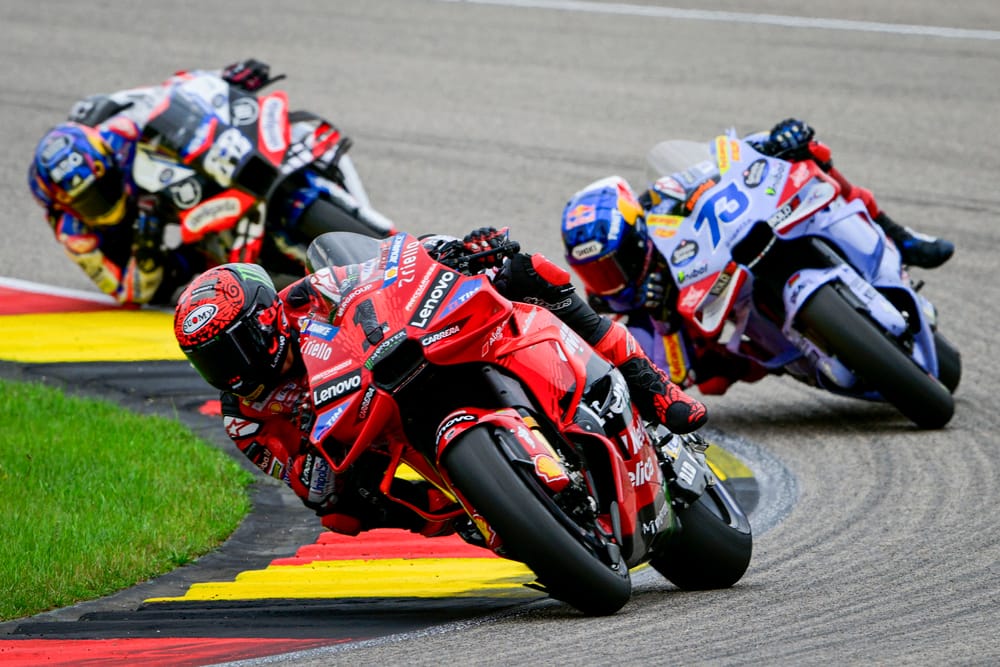until Abu Dhabi Autonomous Racing League

"There are some things that you cannot control. And this weekend somebody said - 'you cannot do it'."
Like the Circuit of the Americas, German Grand Prix venue Sachsenring was double- and triple-circled on the MotoGP calendar as a place where Marc Marquez would surely, finally win on the Ducati.
Unlike at the Circuit of the Americas, though, where nobody could really live with Maverick Vinales and his Aprilia, Marquez did seem to maybe have that something extra at the tiny Saxon venue - only for his weekend to unravel in dramatic fashion, in stages.
He didn't seem to mind it by the end, celebrating rambunctiously with brother Alex Marquez on their bikes and in parc ferme as they got to share a MotoGP podium for the first time ever.
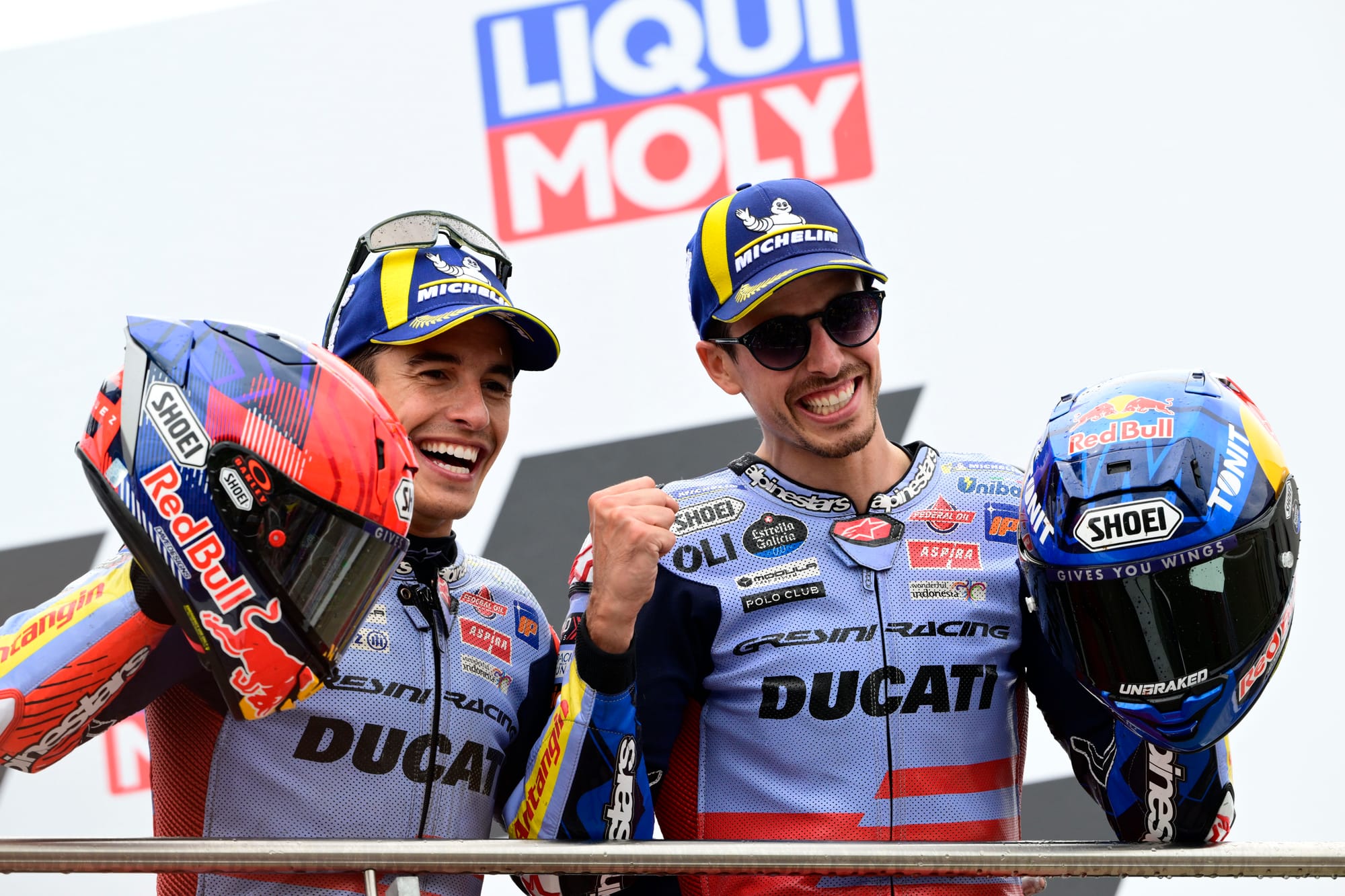
"I promise you I would exchange the victory to be with my brother on the podium, it's some feeling, amazing," he told MotoGP.com at the finish.
One cannot say it with any certainly - but any time he ran in normal conditions, Marquez showed the pace to at least be in the mix for a win.
One of his big limitations on the Ducati had been how he started weekends and how long it took him to zero in on his pace, especially over a single-lap, but Marquez was comfortably quickest of those forgoing a fresh-tyre run in opening practice and seemed to be able to summon a table-topping laptime at will through much of Friday's running.
But perhaps "at will" are the wrong words here. A crash in the closing stages of the 45-minute morning session rang an early alarm bell, then a bad fall on his first flyer in the hour-long follow-up ended any chance of a straightforward weekend.
Cruel irony #1
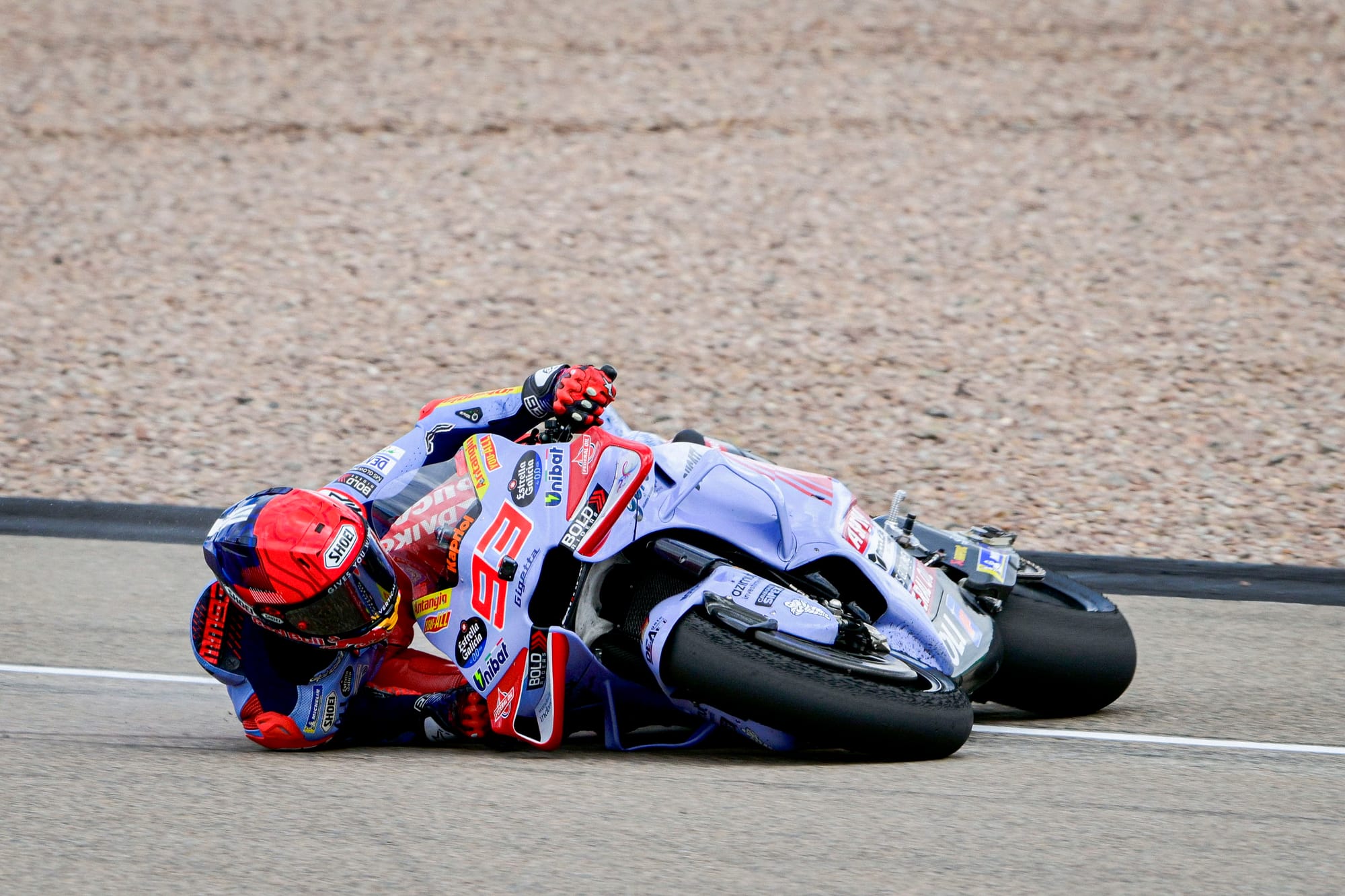
Sachsenring's Wasserfall corner is never a nice plan to crash, but what was merely a high-speed low-side courtesy of a tucked front turned into a bad high-side once Marquez's knee touched the ground.
He admitted later that he was trying to save the crash, when normally he would not. "This was the problem," he acknowledged. "If not, at that point you just jump from the bike and that's it."
So why didn't Marquez do exactly that? Because at that point he feared it would've meant the end of his session and an unwanted ticket to Q1.
Second crash of the day for @marcmarquez93 but this one was HUGE! 💥
— MotoGP™🏁 (@MotoGP) July 5, 2024
The 8-time World Champ suffered a massive highside at Turn 11! 🤯 Thankfully Marc was declared FIT after a quick medical check! ✅#GermanGP 🇩🇪 pic.twitter.com/4wBUtv98lh
Marquez had gone out to begin first practice and immediately returned to the pits because that bike wasn't working. After using the spare, he went out with the faulty bike again in practice two - and again brought it back into the pits.
The mechanics switched the medium front and the medium rear to the spare bike, the rubber cooling down a bit in the process. That, given the treacherous windy conditions, led to the initial tucking of the front.
"I said 'what, it's not possible', I tried to save, because I knew that the other bike was not ready and the practice was finished [if I crash]," Marquez explained.
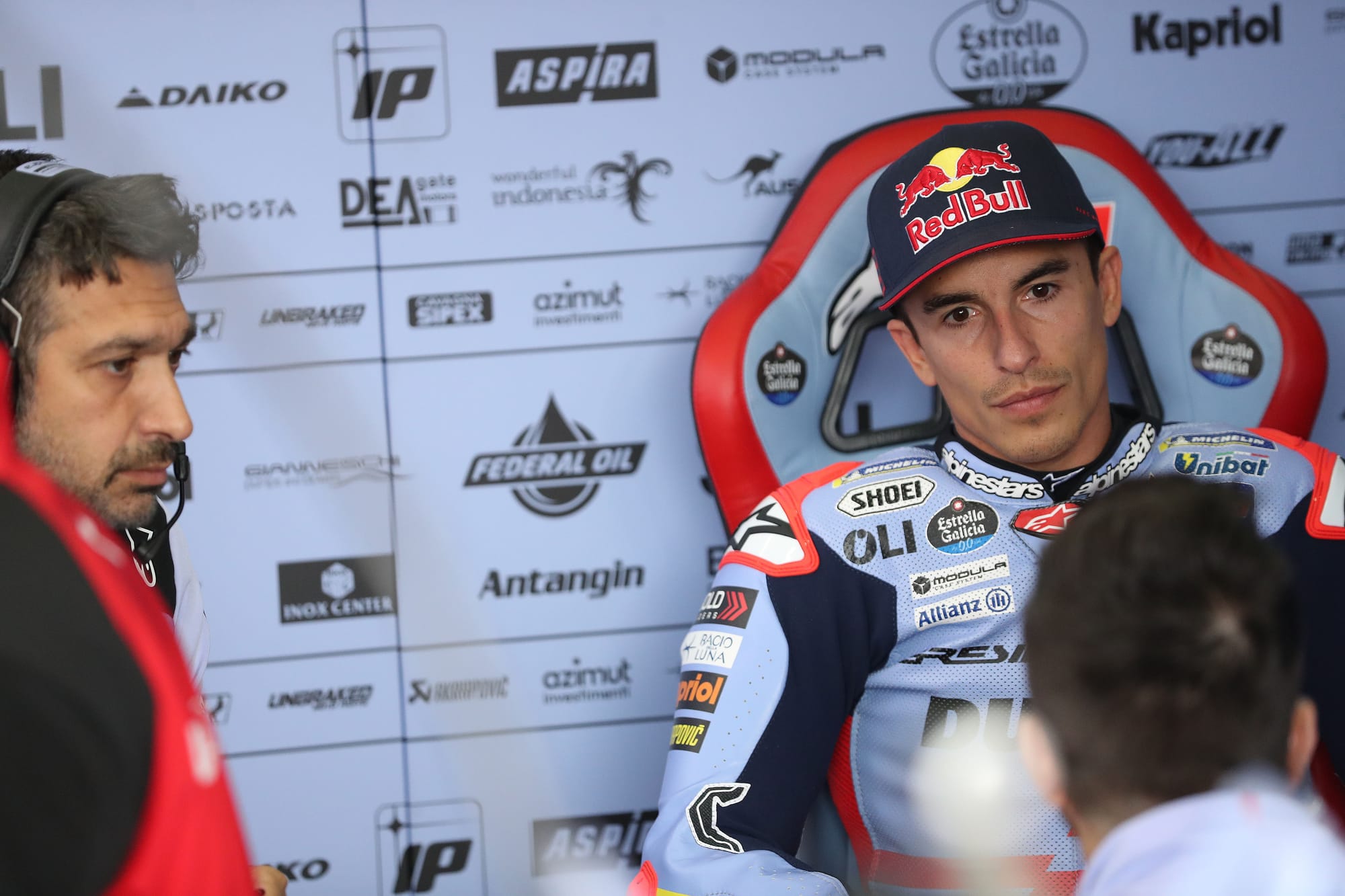
"But then fortunately the mechanics had a miracle and found the problem. They took two days to find the problem of this bike and then they found the problem only in 10 minutes. It was a stupid problem."
Had Marquez known the other bike would work - which was conclusively proven later in the session - he would've probably avoided the injuries.
Fracturing his left index finger in the accident was "not a problem", Marquez claimed. "Because it's broken but okay, it's acceptable," he said matter-of-factly.
But the rib bruise left him constrained, struggling over longer runs due to pain increasing as he "started to breathe more deeply".
"I promise you that if we are in a right[-dominated] circuit, impossible to ride. But with only two right corners I can accept or I can tolerate that pain."
Cruel irony #2
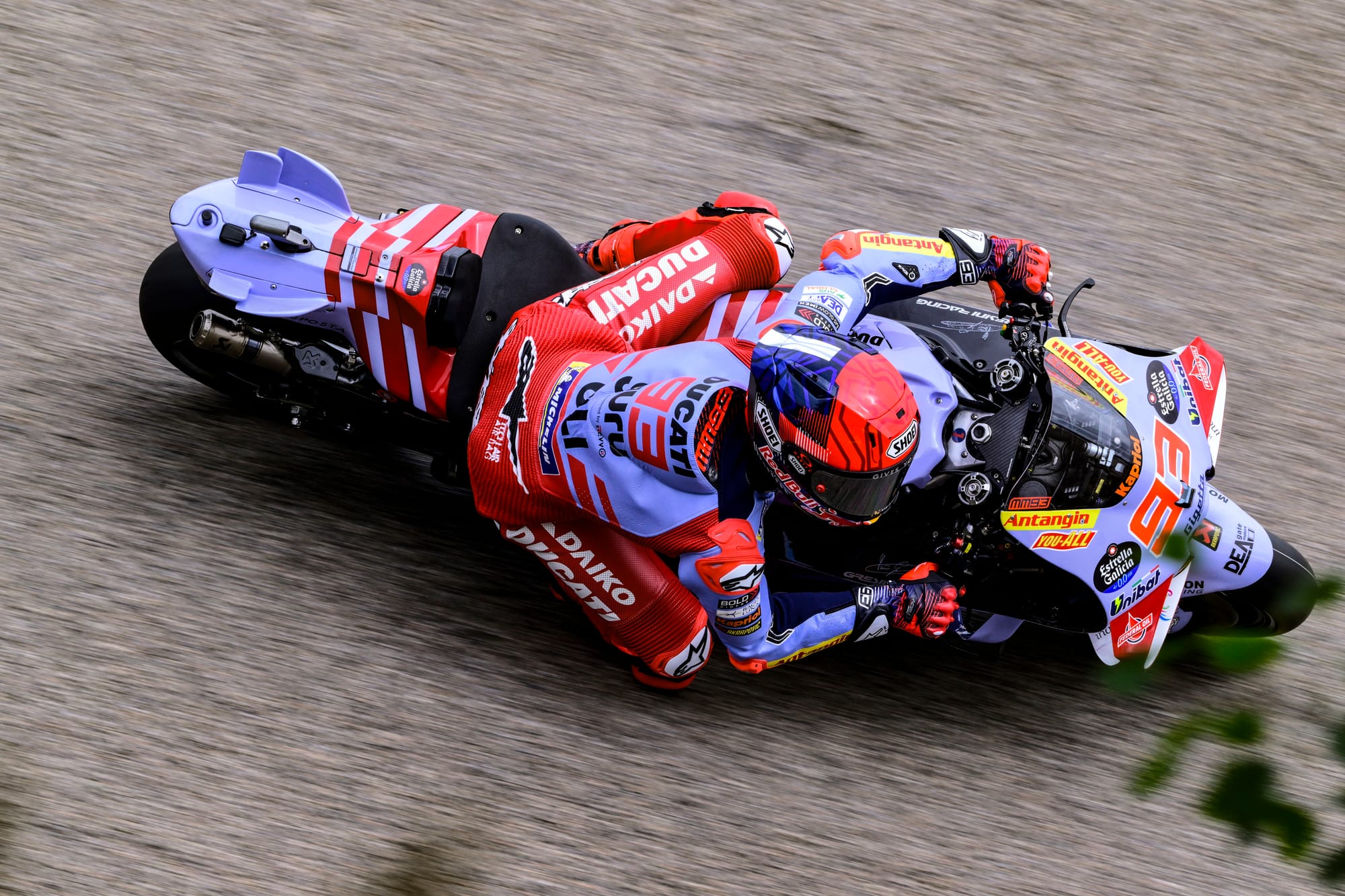
Marquez underlined again the fact that the pace was there by returning to the track and firing in the best time of the session with a soft rear tyre, before the pain forced him to the sidelines.
The chequered flag proved too far away still in terms of time remaining, with Marquez eventually relegated to 13th as riders ramped up their pace.
This meant - amid intramuscular injections to manage the pain - Q1 on Saturday morning, from which a fit Marc Marquez should've still made it out with ease and even a battered Marc Marquez should've probably done so, too.
But, while in a transfer spot, his second run was interrupted by a mechanical issue that forced a return to the pits, leaving time for just one lap on the other bike - a lap which was then duly ruined by Stefan Bradl.
LAP RUINED ❌
— MotoGP™🏁 (@MotoGP) July 6, 2024
Game over for @marcmarquez93 as he encounters @stefanbradl on his way! 😱
The incident is under investigation ⚠️#GermanGP 🇩🇪 pic.twitter.com/Mtqu0FatAS
A former Moto2 title rival of Marquez's who became his good friend and a deeply valued colleague at Honda, Bradl was caught in no man's land on the apex of Turn 2 after deliberately going wide at Turn 1 - and, as he cut across the track in a desperate attempt to avoid getting in the way, he still did just that, except more dangerously.
Speaking to Red Bull-owned Servus TV, Bradl had no qualms about taking the blame, though also pointed out that the Sachsenring's tight nature had played its part.
Marquez had appeared in no mood to accept his apology immediately, but quickly cooled off.
"For me, with Stefan we have a very good relationship. And he said to me 'you are the last one that I want [to do this with]'. There, in the incident, I was angry - I was not angry with him, I was more angry that it was the last lap and that I had the mechanical problem [earlier].
"But it's normal. Here in Sachsenring it's normal because it's a super-narrow track and it's difficult to understand. The second thing is, when you are a wildcard, sometimes it's super-difficult to understand how fast arrive the other bikes. So, no problem with Stefan."
The recovery job
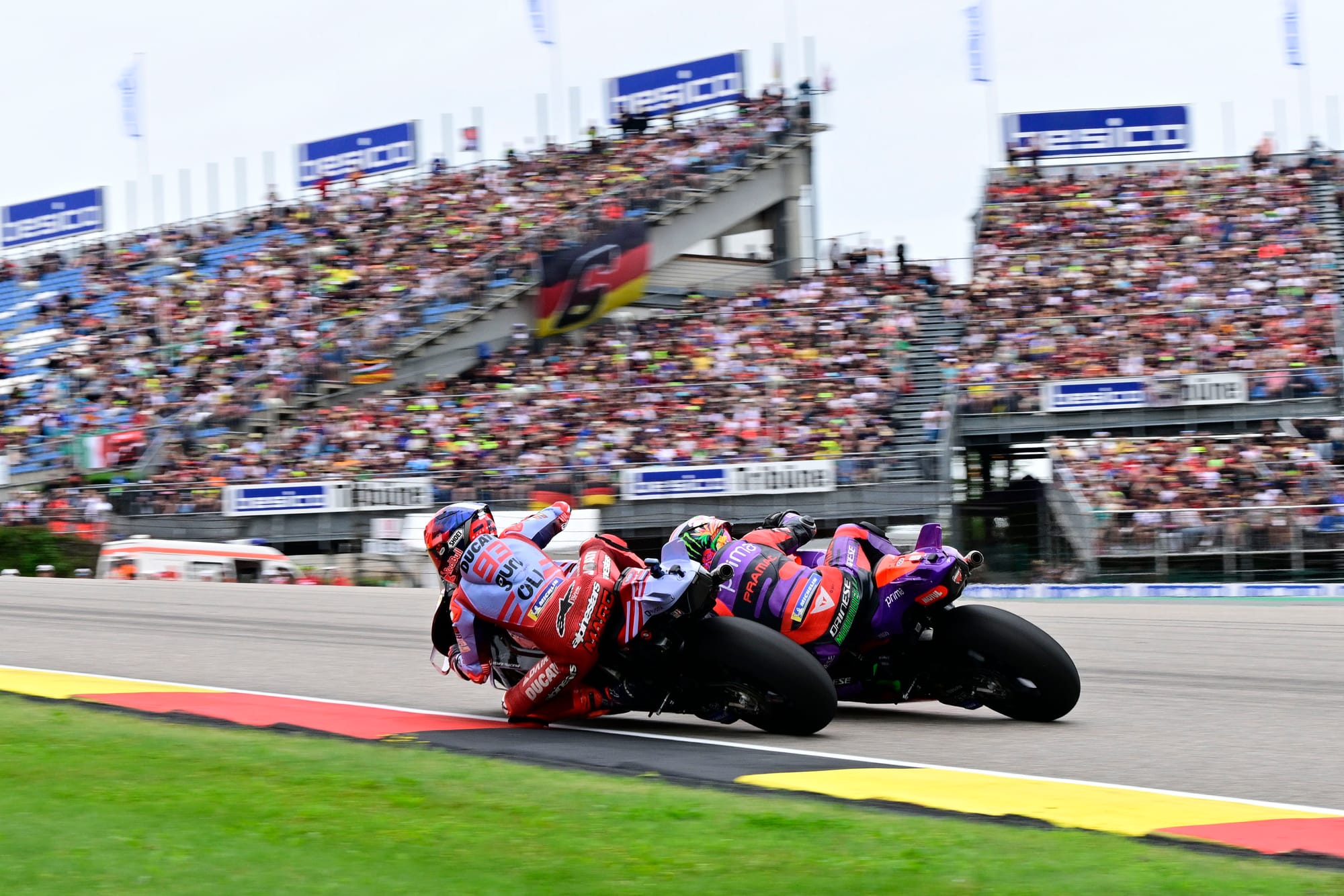
After a weekend like that, Marquez would've probably happily signed under the way his Sunday race played out even without the added bonus of sharing the podium with his brother.
He lifted himself to ninth place on the opening lap, then methodically worked his way past the likes of Raul Fernandez, Enea Bastianini and Miguel Oliveira - with Maverick Vinales removing himself out of the way through error.
But with Franco Morbidelli next in his sights, the Italian running wide at Turn 1 put the pair on a collision course as Morbidelli returned to the racing line, costing Marquez a hefty chunk of laptime there - with his subsequent efforts to fight off Bastianini, overtake Morbidelli and then reel in and overtake his brother another hint of the kind of pace that was potentially on offer.
CONTACT! 🤯
— MotoGP™🏁 (@MotoGP) July 7, 2024
Disaster avoided after @marcmarquez93 and @FrankyMorbido12 collided 😱#GermanGP 🇩🇪 pic.twitter.com/blPyxK7JjX
The wait for the first win goes on, and with the Desmosedici GP24 so potent at this moment in time this may have been the best opportunity.
Certainly, though, Marquez didn't look like somebody thinking about that at the chequered flag. He's won 59 times already in MotoGP, and he'll back himself to win again, whether on the Gresini or in Ducati works red.
He also didn't sound totally convinced a win really was there for the taking, reiterating that both Bagnaia and Jorge Martin remain faster. Given that Marquez insisted he wasn't actually limited by his injuries on Sunday, just the prior days, the fact he dropped from one second behind Bagnaia at halfway to nearly four at the chequered flag certainly suggests it would've been no walkover.
But, as mentioned above, there was the Morbidelli collision. And there was track position, a bigger factor at the Sachsenring than at most venues.
"You have only one-two points to overtake. Last corner or Turn 1. Then you cannot do anything. You are not Superman. On that Turn 1, as soon as you pass Turn 1 until Turn 12 you cannot overtake, it's impossible."
So, maybe it was quite winnable. But there's enough of a maybe on the other side to suggest it would've been far from guaranteed.
In that context, trading a shot at win 60 for the chance to share the podium with his brother is almost a no-brainer.
What a way to go on 🏖️ pic.twitter.com/elLGNz2Bfa
— Gresini Racing (@GresiniRacing) July 7, 2024
